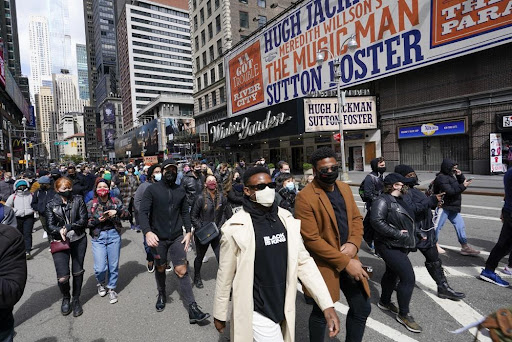
By Mark Kennedy, Associated Press
A wide Broadway coalition of theater owners, producers, union leaders, creators and casting directors have hammered out a series of reforms and commitments for the theater industry to ensure equity, diversity, inclusion and accessibility. The New Deal for Broadway emerged following a summit of industry leaders organized by Black Theatre United earlier this year. It outlines reforms that are short-term — to be implemented prior to Broadway’s reopening this fall — and long-term over the next few years.
“Just as we are all committed to create safe environments free from discrimination, sexual harassment and bullying, we are committed to create environments that are equitable, diverse, inclusive, accessible and in which everyone has a sense of belonging,” the document states. The focus is on Black theater members. The changes range from the abstract — “to push for more diversity” — to the specific, like that artists with visual disabilities be offered Braille audition materials.
“This is just the beginning for us. We’re hoping with this document that it will have a ripple effect throughout our industry for all other members of the community,” said Tony Award-winner LaChanze and a founding member of Black Theatre United, told The Associated Press. One thing the groups all agree to is that they will adopt “an EDIAB policy” — which stands for equity, diversity, inclusion, accessibility and belonging — and post it on websites, theater lobbies and audition rooms, making it clear to everyone before rehearsals begin and mandate its training. But what that exact policy will be is still to be determined by each group.
“Each organization is going to create their own policy that we will be monitoring to make sure that they are in accordance to the New Deal,” said LaChanze. “We are not the ones writing out what the policy is going to be. We established guidelines for what it must include, but each company has to provide the exact language.” Black Theatre United was formed in response to the wave of national unrest over racial injustice that followed the police killing of George Floyd in Minneapolis in 2020. In addition to LaChanze, its founding members include Audra McDonald, Billy Porter, Norm Lewis and Vanessa Williams.
Data from Broadway indicates vast inequities, according to the Asian American Performers Action Coalition. Its annual study, “The Visibility Report: Racial Representation on NYC Stages,” indicates that nearly 80% of Broadway and off-Broadway show writers were white, as were 85.5% of directors, during the 2017-18 season, the latest time frame analyzed. On stages, over 61% of all roles in New York City went to white actors. Data on designers is even more unbalanced: In the 2018-2019 theatrical season, 91% of Broadway design slots were filled with white designers. LaChanze said the killing of Floyd and last summer’s protests galvanized the industry to change. “Everyone wanted us to go back into the theater, not the way we left it,” she said.


